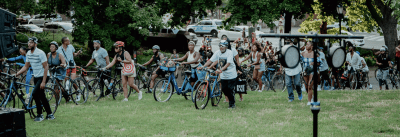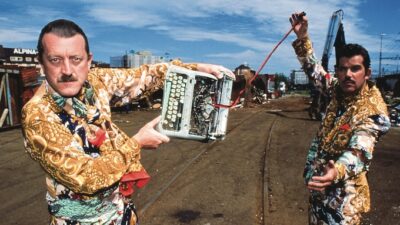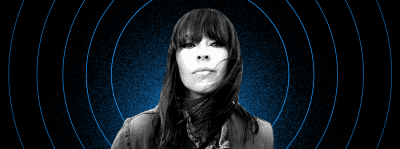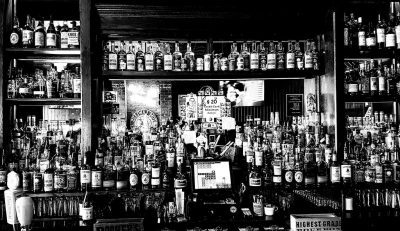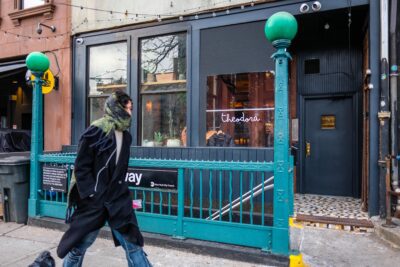The ‘dirty, human’ theology of Reverend Vince Anderson
For more than 20 years, Vince Anderson has held 'dirty gospel' sermons in Williamsburg bars. Now he's the subject of a documentary
Sunday might be when most folks go to church, but for more than two decades, Reverend Vince Anderson has been conducting his sermons in sweaty Williamsburg bar back rooms on Monday nights.
Equal parts Joe Cocker and John the Baptist, Anderson’s weekly show at Union Pool is a musical kaleidoscope of influences from the Mississippi Delta region, what he calls “dirty gospel,” and impromptu community building with his audience/flock.
“Once you come in to this room you’re experiencing a religious act, because we’re dealing with spirituality on some level and we’re dealing with it together,” he says in a new film about him, called the “The Reverend.”
Anderson is actually a seminary school dropout but that doesn’t make him any less of a real minister. By day he is the music and artistic director at Bushwick + Abbey — queer-friendly Christian community — with nighttime residences going back to Black Betty (RIP 2009) and now Union Pool, where he performs every Monday night with his band Love Choir. Jaleel Bunton from TV on the Radio plays guitar in the band and Roots drummer Questlove has been known to sit in from time to time.
And now the Reverend is the subject of a documentary, by filmmaker Nich Canfield. “The Reverend,” opening at the IFC Center on July 22 and at Nitehawk Cinema the next week.
Canfield had been going to Anderson’s shows for almost a decade before the two met through mutual friend Paula Henderson, who plays saxophone in the Love Coir.
“It’s more than just a musical concert. It’s a spiritual experience,” he says. “And that’s what made me want to make the film.”
Filming began in the summer of 2015 and lasted through 2019. The movie was finished two days before Covid lockdowns went into place.
While “The Reverend” would have to wait to find its audience, Vince never stopped performing.
He was scheduled to play his regular gig the day the city began lockdowns. That night, without prompting, Vince opened his laptop and live streamed his first show of the Covid-era. A little global pandemic wasn’t about to stop him from spreading the word.
“I had my first church music job when I was 12,” says Anderson. “I’ve done that for my entire life, as a choir director, piano player, or organ player in church.”
Brooklyn Magazine spoke with Reverend Vince Anderson about the “dirty gospel” and his theological roots. He tells us about getting naked at shows, the historical overlap between churches and bars, and ends the conversation with a lament about the demise of public singing in America — and why he thinks it’s one of the reasons the country is in trouble.
Before we get started: What have you heard about Union Pool since the fire earlier this month? Any news on that front? How are you taking that all in?
The good news is that it’s physically in good shape and it will reopen, probably by next Monday. Just waiting on inspection from the city. Union Pool is one of my churches. A place where community gathers. And in reality, with the food pantry every Wednesday and the Monday night services it feels and operates more like a church than most churches. The staff has really worked hard to get it back into shape.
Is it fair to describe your shows as “Joe Cocker meets John the Baptist”?
That’s a good one! I’ll take it. Nobody’s ever said that before. I like it.
What makes what you do “dirty gospel,” as you call it?
“Dirty gospel” is how I describe music from the Mississippi Delta region. That’s the source of a lot of my inspiration. The blues, the gospel, all the way from New Orleans up to Chicago. But it also describes my theology. A good theology needs to be dirty and human, as well. Rooted in the earth rather than in the heavens.
The documentary touches on you getting naked at your shows back in the day. What’s the story behind that?
It was never really planned. It wasn’t a performance piece that I decided to do. It was more about vulnerability. If the show was going to one level and I wanted to connect more with the audience and the spirit, it felt like taking off clothes would be the way to push it. When I’m asked about it, I tell people Moses took off his shoes and I took it a step forward.
What happened to your weekly show at Union Pool during the pandemic, which hit immediately after the filming of this doc?
I was scheduled to play the day of the shutdown And of course, the city shut down. That night, having no idea what I was doing, really no idea at all, I put up my computer and my cell phone and did my first live stream. I did that all the way through the pandemic. Took a few Mondays off, just for my own sanity, but I pretty much continued the residency from my living room.
There’s a sort of apocryphal belief that Martin Luther wrote Christian hymns set to secular tavern songs. So while a gospel concert in a bar sounds weird, that association has been made for over 500 years.
There’s a long tradition of it. You mentioned Martin Luther, but also the church and the club in African American culture have always influenced each other. There’s been a crossover in country music, too, and all kinds of genres. It’s not all that new, it’s been there for years.
You’ve said that watching “The Last Temptation of Christ” made you spiritually reborn. Will you talk about the experience?
I was in college at the time and like a lot of college students, I left a notion of Christianity behind, though I was still working as a church musician. But that film really captivated me. I actually had to drive down to LA where it was playing and crossed a picket line of nuns and priests to see it. Seeing a very human portrayal of Jesus really touched me and moved me in a way. Because Jesus was always a little bit of a hang up for me. I was really into the Holy Spirit, but not this Jesus character. The film made a good point of not stripping Jesus of divinity, but of making him a human being through the temptation sequence, [which] really enlightened me of Jesus as brother and as a fellow human, fellow traveler.
How do you describe your faith?
At the core, I’m a humanist. I believe in humanity. And I also believe, on most days, in what you call it faith. I believe in some kind of higher being as well. For me, the story of Jesus is the story of God becoming human, versus the other way around. And “Last Temptation” reflected that for me.
Fans called you “Reverend” before you took on the title for yourself.
When I briefly went to Union Theological Seminary on the Upper West Side, I wanted the church to be open to freaks like me. I wanted the church to be open to my friends, to the artists, and LGBTQ people. And that’s the church I ended up with, but it ended up being at a bar instead of a church. Maybe that was part of the divine plan? I certainly considered my ordination, originally, to come from the people. Much like in the early Church where ordination came from the people that you minister with. People started asking me to baptize their kids, marry them, and bury their dead. That’s when it was like, “Oh, this is my community. This is my church, and they’re asking me to do these things.”
Did you have to become ordained to do weddings and funerals?
I held off when people started asking me to do those things because I didn’t have any legal footing. But then then I met Jay Bakker [son of televangelists Jim Bakker and Tammy Faye Bakker Messner], and he had a church called Revolution. In the evangelical tradition ordination is a little looser than it is in mainline Protestantism. So he ordained me as part of his church. Now I’m with Bushwick + Abbey. It’s an Episcopal Church and they recognize my status as an ordained person, but not as a priest, because I’m not in that tradition.
In the movie, you say about Americans, “not singing together is one of the reasons we’re in the mess we’re in right now.” What do you mean?
I’m really committed to making sure that groups of people sing together. I think it’s hard to be mad at people when you’re trying to harmonize. It’s not impossible, but I think there’s something about this life that we’ve gotten more and more separated, and choirs aren’t a thing anymore. You don’t have community choruses so much. The church is not what it used to be and so there aren’t places where we can just get together and sing. The closest we get to that is karaoke and it’s an individual starring into a screen. I think that’s a damn shame.
You might also like 

















